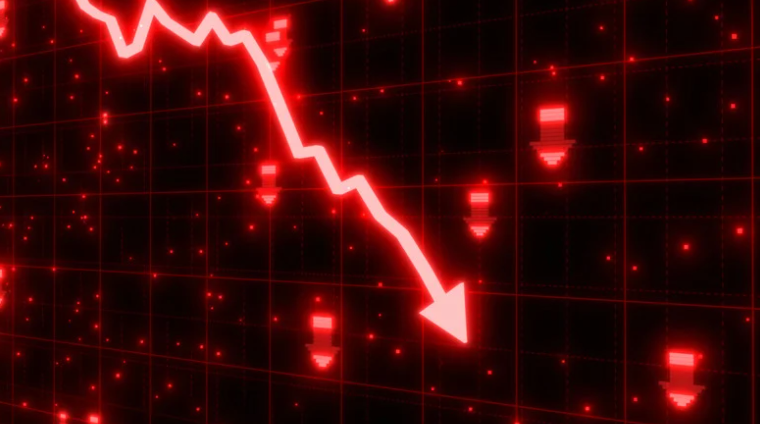Global Financial Markets Decline Amid U.S.-China Naval Tensions
Hong Kong — Global financial markets experienced sharp declines on Monday following reports of a dangerous escalation between Chinese and U.S. naval forces in the South China Sea. The incident, which occurred near the disputed Spratly Islands, has heightened fears of a potential military confrontation in one of the world’s most strategically important waterways.
Details of the Incident
According to the U.S. Department of Defense, a Chinese destroyer came within 150 feet of an American guided-missile destroyer that was conducting a freedom-of-navigation operation in the area. The U.S. Navy characterized the maneuver as “unsafe and unprofessional.” Pentagon spokesperson Brig. Gen. Patrick Ryder reaffirmed the U.S. stance, stating, “The United States will not be intimidated by aggressive actions in international waters. We remain committed to upholding the principles of freedom of navigation and international law.”
China’s Response
In response, China’s Ministry of Foreign Affairs accused the U.S. of provocation, claiming that the American vessel had illegally entered its territorial waters. Ministry spokesperson Wang Wenbin stated, “This is a serious violation of China’s sovereignty. We urge the United States to immediately cease its provocative actions and respect China’s rights in the South China Sea.” This exchange underscores the heightened tensions and the conflicting narratives surrounding maritime rights in the region.
Market Fallout
The implications of this incident were immediate and significant. Global financial markets reacted sharply: the Dow Jones Industrial Average dropped 2.3%, the Hang Seng Index in Hong Kong fell by over 3%, and oil prices surged due to concerns over potential disruptions in critical shipping routes. Julia Hammond, a senior analyst at Goldman Sachs, remarked, “This is a wake-up call for investors. The risk of geopolitical conflict in the region has always been there, but this escalation is putting those risks front and center.”
Strategic Importance of the South China Sea
The South China Sea is a pivotal corridor for global trade, with trillions of dollars in goods passing through each year. The area is also rich in natural resources such as oil and gas reserves. China’s expansive territorial claims, known as the “nine-dash line,”, are contested by several international stakeholders. An international tribunal in The Hague has rejected China’s claims, yet the U.S. and its allies, including Japan and Australia, continue to challenge this assertion through freedom-of-navigation operations. Dr. Erin Walsh, a geopolitical expert at the Atlantic Council, emphasized, “This region is a flashpoint for great power competition. Incidents like this highlight the potential for small provocations to spiral into broader conflicts.”
International Reactions
The escalation did not go unnoticed on the international stage. Several U.S. allies, including Japan and the Philippines, expressed support for the U.S. position, with Philippine Foreign Affairs Secretary Enrique Manalo stating, “The international community must stand united against actions that threaten regional stability.” Additionally, the European Union issued a statement urging de-escalation and adherence to international law, signifying widespread concern over the rising tensions between the two superpowers.
Risk of Escalation
Analysts warn that the risk of further escalation looms large, with China increasing its military presence by building artificial islands and deploying advanced weaponry. Following these events, the U.S. has sought to strengthen alliances through the Quad framework, which includes Australia, India, and Japan. Dr. Andrew Preston, a professor of international relations at Cambridge University, remarked, “This is a high-stakes game of brinkmanship. The question is whether both sides can manage this crisis without miscalculation.”
Diplomatic Channels Open
Despite the tensions, both nations appear keen to pursue de-escalation avenues. U.S. Secretary of State Antony Blinken and Chinese Foreign Minister Wang Yi are expected to hold emergency talks later this week. Blinken noted, “This incident underscores the urgent need for dialogue. We must work together to reduce tensions and prevent further incidents that could jeopardize regional stability.” The willingness of both governments to engage in diplomatic discussions may be crucial in averting a larger conflict.
Conclusion
As the world watches closely, the South China Sea remains a pivotal hotspot for geopolitical tensions with significant implications for global security and economic stability. The recent naval incident highlights the delicate nature of international relations in the region and the potential for a miscalculation to escalate into serious conflict. The outcomes of upcoming diplomatic engagements between the U.S. and China will be pivotal in shaping the future dynamics of this volatile area.
FAQs
What sparked the recent tensions between the U.S. and China in the South China Sea?
The tensions escalated following a close encounter between a Chinese destroyer and a U.S. guided-missile destroyer, which China claimed was a violation of its territorial waters.
How did financial markets respond to the incident?
Financial markets experienced sharp declines, with the Dow Jones Industrial Average dropping 2.3%, and oil prices spiking due to concerns over potential disruptions in shipping routes.
What is the strategic importance of the South China Sea?
The South China Sea is a vital trade corridor, with trillions of dollars’ worth of goods passing through annually, and is rich in oil and gas reserves. Its geopolitical significance makes it a point of contention among nations.
What has the international reaction been to the tensions?
U.S. allies, including Japan and the Philippines, have expressed support for the U.S. stance, while the European Union has called for de-escalation and respect for international law.
What diplomatic efforts are being made to address the situation?
U.S. Secretary of State Antony Blinken and Chinese Foreign Minister Wang Yi are expected to hold emergency talks to address rising tensions and explore opportunities for de-escalation.

